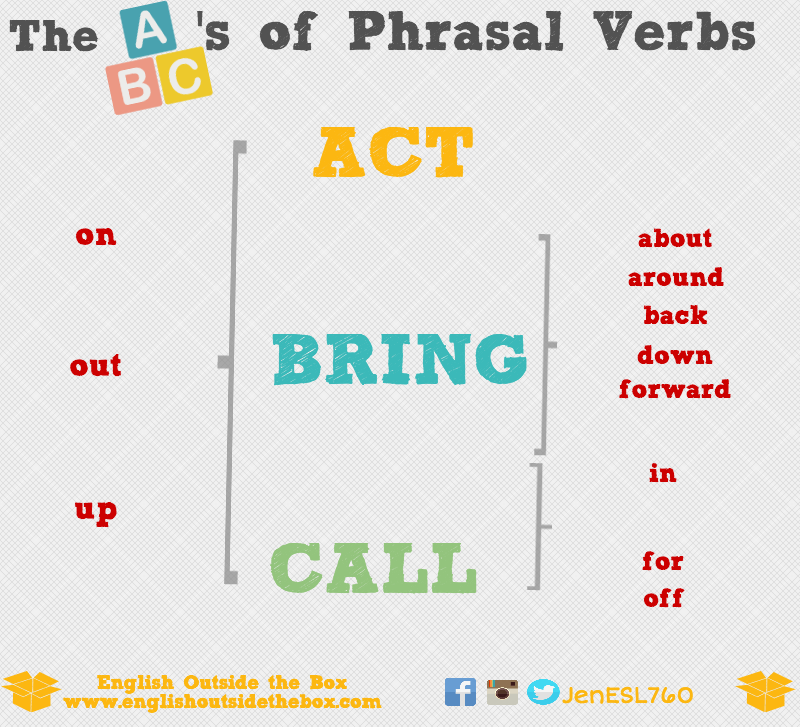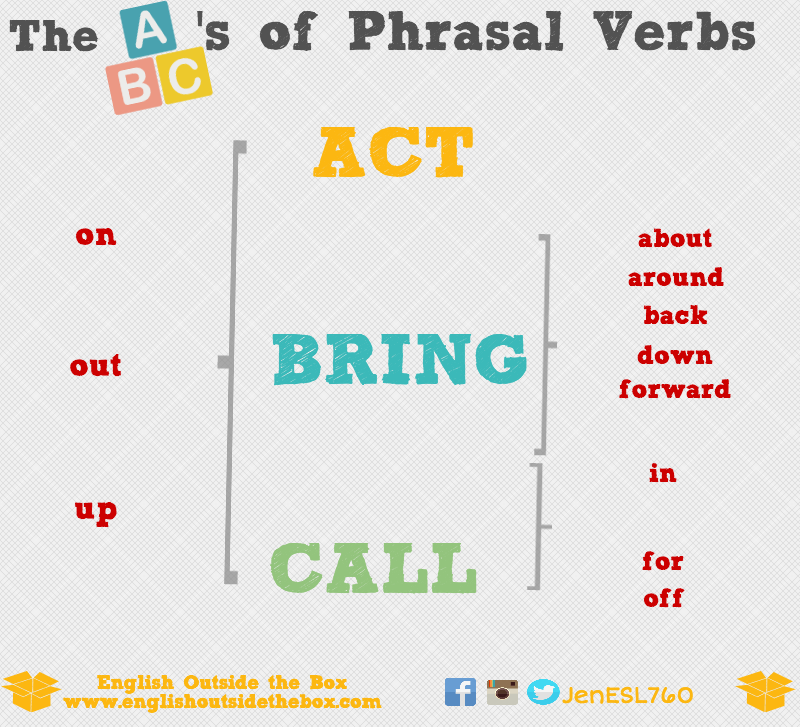
The ABC’s of Phrasal Verb Friday
TGIF! Happy Friday! Wherever you are in the world, I hope you have/are having/had a glorious day! Phrasal Verb Friday is back, teaching you the ABC’s and bringing you strategies to make learning even more effective. Remember, long ago, when I told you that a great way to learn phrasal verbs is by focusing on some main verbs and building on the particles. No? Have a quick review here then… There’s even a video of me!
Today’s post uses that same strategy, using only 3 base verbs, and will help teach you over 20 new phrasal verbs. Check out the infographic below first, and before jumping straight to the definitions, see how many you already know. Make some predictions and test your guessing skills. It’s always important to try and engage yourself as much as you can while learning, making the experience as active as can be! How do you engage yourself while learning? You can connect your visual senses while reading, write out the definitions and examples while thinking aloud (thinking + speaking), and try recording yourself saying these phrasal verbs + definitions to get some auditory/listening engagement going. All of these [EASY] exercises are a sure way to activate your mind throughout the whole process!
How many did you know? Did you make any predictions? Share your predictions with me, in the comment section.
Definitions & Examples:
A
act on: (also act upon) + object~ when you use a feeling, or suggestion as a reason for doing something
-Even though Luci was jealous of her coworker, she’s happy she didn’t act on that jealousy because it would have made the problem worse.
act out: to behave badly because of negative feelings, or showing your pain through poor behavior.
-The child was angry about not getting a toy, so she acted out in the store by throwing a tantrum.
act out: to perform a play or scenes from a movie or book.
-The theatre students acted out their favorite parts from the play as a way to rehearse
act up: to behave inappropriately
-The new mom was embarrassed when her toddler started acting up in the grocery store.
(for machines: not work properly & for diseases: get worse)
-It was a bad day, not only was my coffee maker acting up, my allergies also starting acting up from the weather
B
bring on: to cause something to happen (sometimes used negatively)
– My boss told me the new project would be a challenge, but I told him to bring it on!
bring out: to present something or make something more easily seen/visible.
– I was wearing the blue sweater to bring out my eyes and because I was having guests over, I brought out the special dinnerware.
bring up: 1) to raise a child 2) to mention something while talking
-1) Because her parents tragically passed away in an accident, she was brought up by her grandparents.
-2) Grant’s boss brought up the many mistakes he had made throughout the year when going over his yearly review.
bring about: + object ~ to cause something
– The rain brought about some leaks in our roof last year.
bring around: 1) to bring someone to a social event 2) to influence someone’s opinion to make them support something
-1) Alex is not too sure about the friend Max keeps bringing around to their Friday game nights. He seems a bit odd.
-2) Although Paulo doesn’t like the idea of having more cats now, I’ll bring him around eventually.
bring back: + object 1) to cause something (object) to return to memory 2) to cause the return of something (object), to bring an object to a location
-1) Listening to that song always brings back the best memories from last summer.
-2) My nieces and nephews always want me to bring back souvenirs from my trip.
bring down: 1) to cause something to fall or lower (including status/power) 2) to cause a person to be sad or in a bad mood
-1) When hanging our new painting on the wall, I had to bring it down a bit to fit the space.
-2) Her negative attitude full of complaints was not going to bring me down!
bring forward: to show, present, or talk about something in order for it to be used in a discussion or situation
– The lawyer brought new evidence forward to help her client in the case
bring in: 1) to earn money, for work, a job, etc.. 2) to cause a person to be involved in something (also bring into) 3) to cause someone to go to a place
-1) John has a great quarter he brought in over $100,000 in sales.
-2) I asked my parents to not bring me into their fighting.
-3) The end of the year sale was created in hopes of bringing new customers in.
C
call on: to ask someone to do something, or a student to respond to a question
– Teachers always call on the shy students to answer questions in class.
call out: 1) to speak in a louder voice; to yell 2) to publicly criticize something or state what they did/said in a negative way
-1) I tried to call out to a friend I saw at the park yesterday, but she was too far away and didn’t hear me.
-2) When Jessica was making fun of a stranger, Mary called her out in front of everyone, saying her actions were inappropriate.
call up: to make a telephone call to someone
– I call up my friend who lives abroad nearly every week to stay in touch.
call in: 1) to make a phone call somewhere, often used with work to say you’re sick. 2) to make an order for something to be delivered 3) to ask someone for help
-1) I called in sick last week when I got the flu.
-2) We were so tired after a long work day that we just called in for a pizza.
-3) The couple continued to have marital issues after years of therapy, so they finally called in a relationship expert.
call for: to state (often publicly) that something is required or needs to be done
– The city council called for changes in the city.
– The job calls for someone with strong computer skills
call off: 1) to stop doing/planning something; to cancel 2) to be asked not to come into work
– The birthday party in the park was called off due to the weather forecast stating rain.
– The restaurant didn’t have any reservations, so 2 of the waiters were called off.
Some Sample Questions:
Do you have a little baby brother or sister who often acts up?
Do you bring back something special from every trip?
Why do jealous people always try to bring down others?
Have you ever called in sick?
What is the last event you called off?


[…] It’s been a little while since my last #phrasalverbfriday post, but I was saving a comeback for the perfect day, and here it is! Today we’ll use the technique of focusing on a main verb and it’s existing particles to learn new phrasal verbs. Just a note, in the past, we’ve reviewed a few different ways to learn and/or review this grammar, such as focusing on themes, like love and chores, using listening and context, and the ABC’s! […]
[…] ← The ABC’s of Phrasal Verb Friday […]
That is very useful. Thank you for preparing that and share it with us. I appreciate your work.
I am so happy you love it!